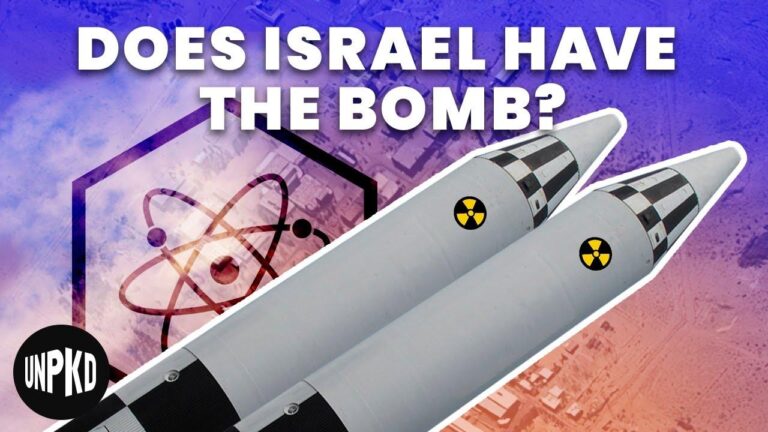In a compelling revelation that reshapes understanding of U.S.-Israeli relations, The Washington Post’s latest analysis uncovers how Israel systematically misled the United States regarding the scope and intentions of its nuclear weapons program. Drawing on declassified documents and insider accounts, the report details decades of strategic deception aimed at maintaining ambiguity while advancing a clandestine nuclear arsenal. This exposé not only sheds light on the complexities of intelligence sharing and diplomatic trust but also raises critical questions about the long-standing policy of nuclear opacity in the Middle East.
Israel’s Strategic Concealment Tactics in Its Nuclear Development
Israel employed a series of intricate measures to mask the scope and progress of its nuclear ambitions from U.S. intelligence and diplomatic scrutiny. Central to its strategy was a policy of deliberate ambiguity-neither confirming nor denying its nuclear capabilities-allowing Washington plausible deniability. The establishment of covert facilities, such as the Dimona reactor, was accompanied by controlled access protocols and misinformation campaigns designed to convey a benign civilian nuclear program. Israeli officials skillfully leveraged diplomatic channels, emphasizing regional security threats to justify secrecy. This strategic opacity effectively created a knowledge gap that limited U.S. pressure and inspections.
Key elements of Israel’s concealment methods included:
- Strict compartmentalization within the Israeli defense and scientific communities to minimize leaks.
- Manipulation of U.S. technological assistance by providing limited, controlled information.
- Use of front companies and foreign intermediaries to import sensitive materials.
- Selective cooperation in international nuclear forums to avoid suspicion.
| Concealment Tactic | Purpose | Outcome |
|---|---|---|
| Dimona Reactor Secrecy | Prevent inspections and limit U.S. awareness | Minimal access granted; suspicious yet unproven |
| Controlled Intelligence Sharing | Maintain U.S. trust while obscuring facts | U.S. intelligence estimates remained uncertain |
| Diplomatic Diversion | Focus U.S. attention on regional threats | Reduced scrutiny of nuclear activities |
Implications for US Intelligence and Policy Oversight
The revelation of Israel’s long-standing concealment of its nuclear capabilities exposes significant gaps in the United States’ intelligence assessment processes. The failure to detect and accurately report the extent of Israel’s program highlights systemic challenges, including reliance on limited sources and potential political biases that may have influenced oversight decisions. This situation underscores the necessity for intelligence agencies to adopt more rigorous, multi-dimensional analytic frameworks that are less susceptible to external pressures and assumptions.
Policy oversight must adapt by enforcing greater transparency and accountability mechanisms within inter-agency operations, ensuring that critical information is neither overlooked nor deliberately obscured. Key lessons include:
- Enhanced cross-agency collaboration: Sharing intelligence data more efficiently to close knowledge gaps.
- Independent verification protocols: Validating partner nations’ claims through diverse, often covert sources.
- Reducing political interference: Maintaining objectivity in intelligence assessments despite strategic alliances.
| Aspect | Pre-Revelation Status | Post-Revelation Implication |
|---|---|---|
| Intelligence Accuracy | Compromised by assumption-based analysis | Calls for integrated, evidence-driven approaches |
| Policy Oversight | Limited scrutiny over allied nuclear activities | Necessitates stricter review protocols |
| US-Israel Relations | Based on incomplete transparency | Requires recalibrated diplomatic engagement |
Strengthening Diplomatic Channels to Prevent Future Deception
To mitigate the risks of international deception, it is imperative to bolster communication frameworks between nations. Transparent dialogue and continuous intelligence sharing can expose discrepancies early, limiting the potential for unilateral concealment of critical information. Emphasizing collaborative verification mechanisms over adversarial tactics strengthens trust and makes covert operations far more difficult to execute undetected. This approach requires not only policy shifts but also new diplomatic norms prioritizing openness.
Key strategies include:
- Establishing multilateral oversight committees with diverse national representation
- Implementing standardized reporting protocols for sensitive programs
- Enhancing technological exchange to allow real-time monitoring
- Creating rapid response teams to investigate anomalies
| Diplomatic Measure | Expected Outcome |
|---|---|
| Multilateral Oversight | Increased transparency & reduced unilateral concealment |
| Standardized Protocols | Reliable data sharing & minimized reporting gaps |
| Technological Exchange | Enhanced real-time monitoring capabilities |
| Rapid Response Teams | Swift investigation to prevent misinformation spread |
In Retrospect
The revelations surrounding Israel’s covert nuclear weapons program and the extent to which it misled the United States underscore a complex chapter in Cold War-era diplomacy and intelligence. As new details emerge, they not only reshape our understanding of U.S.-Israel relations but also spotlight the challenges faced by intelligence agencies in uncovering hidden agendas among trusted allies. Moving forward, these disclosures prompt critical questions about transparency, oversight, and the delicate balance between national security and international trust in an increasingly interconnected world.




